🎄 Merry Christmas, TCRF! 🎄
Mega Man 3 (NES)
| Mega Man 3 |
|---|
|
Also known as: Mega Man III (US), Rockman 3: Dr. Wily no Saigo!? (JP), Rockman 3 (TW, CN)
|
| To do: Properly document the localization prototype. Also, more bugs, like unlocking Rush Jet and Rush Marine out of sequence and the Hard Man softlock that was fixed in the international releases. |
Mega Man 3 is an epic tale about...uh...fighting robots and spring-loaded dogs? The game really could've used some sort of intro.
Contents
- 1 Sub-Pages
- 2 Debug Commands
- 3 Unused Graphics
- 4 Unused Music/Sounds
- 5 Regional Differences
- 6 Revisional Differences
Sub-Pages
| Prototype Info |
| Prerelease Info |
| Unused Rooms & Screens The city is so beautiful at night!! Too bad this wasn't used... |
Debug Commands
While well-known, the commands for Controller 2 are very likely not built-in cheat codes, but rather debugging features that the developers forgot to remove from the game. The European version has these cheats completely removed.
- Hold Right to give Mega Man a super jump. This also allows you to jump out of pits.
- Hold Up to slow down the animations.
- Hold Up + A to freeze the logic timer for some animations, including the player hit animation and some explosions. This will cause bosses and some enemies to freeze in place.
RAM address 0x0098 has some debug features associated with it. Setting bit 1 will force enable the super jump code above by setting the right D-pad input bit in RAM address 0x0017, which holds the buttons that are currently held down on controller 2. Setting bit 0 would have enabled infinite energy for Mega Man and his weapons, however the subroutine that would have done this is not called in the release versions of the game. This subroutine is located at ROM address 0x03CCF5
Unused Graphics
Mega Man
![]()
A turning sprite for the Magnet Missile. In the finished game, the missiles change direction immediately. Interestingly, when the game was remade as part of Mega Man: The Wily Wars, this sprite did make the cut, suggesting that the programmers either didn't notice it was unused or just thought it was a good idea.
![]()
An unused sprite for the Search Snake, which appears to depict it turning downwards over a ledge.
![]()
Sprites for Rush's head ducking down slightly. These sprites were later used in Mega Man 4.
![]()
Sprites for shooting whilst using Rush Marine. Though the Rush Marine can indeed shoot in the final version, its animation doesn't change. These sprites were later used in Mega Man 4.
![]()
An unused bubble sprite for Rush Marine.
Proto Man / Break Man
![]()
Sprites for Proto Man and Break Man's idle animation. The only time an idle sprite for Proto Man is used is during the brief cutscene in Gemini Man's stage, but it isn't animated in that instance. Break Man never uses this animation in-game. Proto Man's idle sprites from Mega Man 4 onwards would have his scarf animated as intended.
![]()
Both Proto Man and Break Man have graphics for shooting while on the ground. In the final game, he only fires while in the air.
| Raw | Animated |
|---|---|
Sprites for Proto Man (un?)equipping his Break Man mask. On the right is a mockup of how the animation might play out in game.
![]()
A sprite that's supposed to be used for Break Man's midair shooting animation, but goes unused due to an error:
![]()
As this image shows, not only did they accidentally use Proto Man's graphics for the top half of the sprite, but they used a completely different sprite in place of the eye, a sprite which otherwise would have gone unused instead:
![]()
Needle Man

Two unused tiles for Needle Man's stage.
Magnet Man
Magnet Missile
![]()
Just like with Mega Man, Magnet Man also has an unused turning sprite for his Magnet Missiles.
Unused Tiles
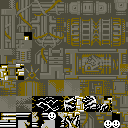
A number of unused tiles for Magnet Man's stage, including an electric current, broken platforms, and some little smiley faces.

While never constructed in the ROM's data, here's a mockup of what some of the broken platforms might have looked like in context. The wire ones in particular needed minor color corrections to fit with the stage's background palette, implying that the background itself might have looked slightly different at one point.

And another reconstruction of how the other metatiles could've been used, compared to their in-game counterparts above.
It seems most of these background tiles would have been used for added variation (with exception of the third, which outright completes a tile that seems to be missing a corner). While it is unknown what the remaining striped metatiles were used for, they could have been prototypes for the rings on the stage's mechanical purple cylinders.
It should also be noted that with some of the tiles being broken, there exists a possibility that Magnet Man's stage was once intended to have been reused as a Doc Robot stage instead of Spark Man's. Doc Robot stages tend to have a destruction/decay theme to them, as can be observed in Spark Man's Doc Robot stage.
Gemini Man

This giant Saturn-esque planet is supposed to appear at the beginning of Gemini Man's stage. Despite taking up a large chunk of CHR ROM and boasting a unique animation using two of the four background palettes, it's never actually seen. The planet's background tiles are placed on the second screen of both versions of Gemini Man's stage, however, the stage uses a parallax scrolling technique that only uses the starfield background from the first screen, preventing the planet from ever being seen. The planet uses background palette 2, while the rings use background palette 1, with the exception of one metatile which mistakenly uses palette 1 in the normal version of the stage.
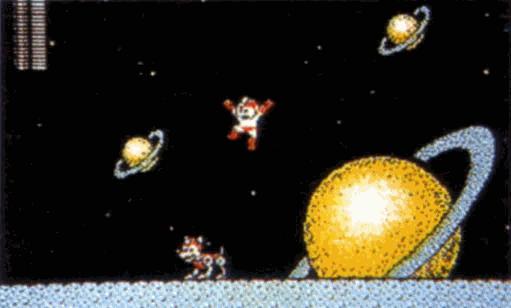
Multiple planets can be seen in early shots of Gemini Man's stage.
Hard Man
![]()
With countless tiles that make up the grounds, walls and ceilings of Hard Man's stage, there were bound to be some casualties.
![]()
These unused tiles appear to be for the mountains in the exterior sections of the stage.
![]()
And near the bottom of the tileset is this piece, which fits the most closely with the metal girders found in the foreground.
Top Man
Two unused background tiles for a different spike graphic and a background detail that may have been used for pits or even in conjunction with this spike. Despite never being used in the stage, the spike's metatile is perfectly functional.
Early Background Metatiles
| In-Game | Hex Values | Recreations |
|---|---|---|
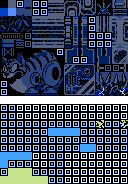
|
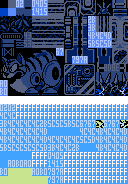
|
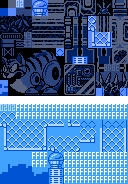
|
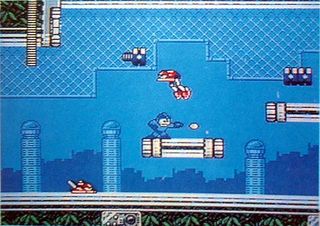
An early screenshot of Top Man's stage shows it using a very different background: There is a fence at the top of the screen and a city with towers at the bottom. The 16×16 metatiles for this background are actually still defined, but the individual 8×8 tiles that comprise them have been replaced with square placeholders. The cycling palette used by the light panels in the background was likely a darker blue originally.
| In-Game | Hex Values |
|---|---|
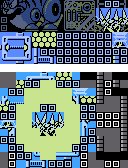
|
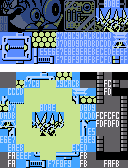
|
In addition to these, there are also 16×16 metatiles for background structures not seen in any shots: Something circular, which has been partially overwritten by tiles used in the final stage, and a standing structure of sorts with one of its tiles still present.
Unseen Palette
| $0F | $27 | $17 | $00 |
This palette is loaded after descending the first ladder: It replaces the fourth BG palette, which is used by the light panels, the Tama minibosses, and the early 16×16 metatiles mentioned above. It is only loaded for three screens and doesn't really fit any of the final graphics it's applied to.
Snake Man
Rising Shooting Sprite
![]()
Unused sprites for Snake Man shooting in midair whilst jumping upwards. He only ever shoots whilst falling, so this sprite is never used.
Search Snake
![]()
Just like with Mega Man, Snake Man also has an unused turning sprite for his Search Snake.
Beam Platform
![]()
A construction beam-like platform, defined as block 66 in the game. It's a simple solid tile that uses the fourth stage palette.
Palette 4 might have changed at some point in development; as it is now, one of the colors is used for the animated cloud effect, and that color is also used on this block, creating an unintended transparency effect.
Unknown Blocks
| In-Game | Hex Values |
|---|---|

|

|
These eight 16×16 blocks in Snake Man's stage are unused. The original graphics for these blocks were overwritten by the Proto Man stopper used in Gemini Man's stage.
The four blocks on the first row, 46-47 and 4E-4F use Palette 4. The blocks on the second row, 56-57 and 5E-5F, use Palette 2. All eight blocks are defined as solid foreground pieces.
Spark Man
Broken Ladders
![]()
Despite their appearance, these 16×16 metatiles actually function as a ladder. The upper tile is the top of a ladder, while the lower tile is a standard ladder. They were probably drawn for the destroyed version of the stage, but aren't used in any of the 32×32 metatiles.
Tube Bottom
![]()
It seems like the tubes seen near the end of Spark Man's stage were supposed to have a bottom piece, likely for tubes that would have come out of the ceiling.
Broken Mesh
![]()
This tile would've been used for the background mesh seen in various parts of the Doc Robot version of this stage.
Junk Piles

Several tiles depicting broken robots and other miscellaneous machinery. There are a number of 32×32 metatiles that use these tiles, and interestingly they are the only tiles in the stage that Mega Man can walk behind! It's safe to assume that these were originally placed at the bottom of the long, vertical shaft midway through the stage, in the hallway with the garbage chutes.
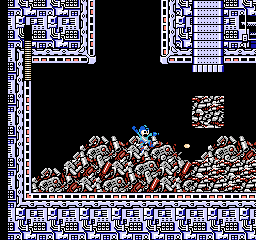
This screenshot is a mockup of what the area might have looked like; the more compact-looking tiles on the right are actually the solid junk tiles used in the final game.
Spikes

The graphics and individual 16×16 metatiles are all that remain of these spikes; however, they do still work as intended. Pop!
Static
![]()
A ball of static that appears in Spark Man's graphics. It's placed after the small diamond-shaped spark balls. It's possible that the small sparks once paralyzed Mega Man, instead of harming him. Note that this uses different graphics than Spark Shock's static ball.
![]()
These horizontal shutter tiles should have been used to lock the boss arena from the top. It's properly set up as block 0D, with the same definitions as the normal shutter. Interestingly, horizontal shutters appeared in Elec Man and Bomb Man's stages in the first game.
Wily 3
![]()
An unused background tile for Wily 3's boss room.
Wily 5
![]()
Unused sprites for the Wily Machine fight including an extra frame for his projectile, a hoop-looking thing, and what appears to be debris from when its spiky feet hit the ground.
Enemies
![]()
An unused sprite for the Bikky enemy.
![]()
An unused sprite for the Bomb Flier enemy.
![]()
Found near the graphics for the Have "Su" Bee and Chibee enemies is this little guy. Due to its appearance and its close proximity to these enemies, it's likely this was supposed to be the cocoon that the Chibee would have emerged out of. Perhaps the Have "Su" Bee was meant to drop these guys, and upon hitting the ground they would hatch into Chibee.
![]()
An unused sprite that appears to be a piece of junk debris for the Junk Golem enemy. This would make sense, since the graphic used for Junk Golem's debris in the final game is the same one that's used for its leg.
![]()
An unused sprite for the Mechakkero enemy that would've gone a long way towards making its jumping animation much smoother. A touched-up version of this sprite was later used in Mega Man: The Wily Wars
![]()
An unused cannon sprite located within the graphics for the Pickelman Bull enemy.
![]()
An unused platform with a blinking animation. Due to its animation, as well as being located near the Bomber Pepe's graphics, it's possible that this was the original Gemini Blocker graphic.
![]()
An unused sprite for the Tama miniboss' paw, most likely for throwing its yarn balls which lacks an animation in the final game.
Other
![]()
A picture of Mega Man from behind. This is found in the same graphics bank as the Mega Man from the Get Weapon screen. Its intended use is unknown.

Extra frames of animation exist for Break Man's Stage Select mugshot showing his scarf fluttering in the breeze. His scarf is static in the final game.
![]()
Some kanji characters are used in the Rockman 3 robot information screen (the one with the Robot Masters from Rockman 1), but about half of them aren't used. Interestingly, all but one of these kanji are used in the backstory found in the Japanese manual, which strongly suggests (alongside the unusually long opening music) that this game was supposed to have an intro sequence.
The only kanji not used in the manual or the game is 犬, "dog", definitely referring to Rush. Perhaps Rush was supposed to have an entry in the ending?
![]()
These eight letters are also found in the same bank as the unused kanji. They're styled differently from the standard font used everywhere else, and judging from their arrangement, once spelled out "YOU GOT" and "AND".
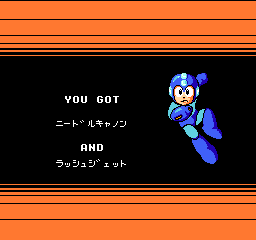
It's possible that the weapon acquisition sequence once used Japanese text for the weapon and Rush adapter names. This is a mockup image of how that would look.
| In-game | Full |
|---|---|

|

|
Part of the weapons menu border is cut off by the edges of the screen, so some of the border tiles are "unused".
| Raw | Animated |
|---|---|
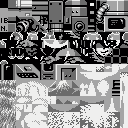
|
Some silhouetted birds can be seen in the ending tileset right beside Wily's UFO a "fat bluebird".
An arrangement of five of these is hidden in the animation data for the game (seen right). Were they supposed to be flying on the horizon?
Unused Music/Sounds
Ending
1 minute and 12 seconds worth of this song plays during the ending. In addition, the song also loops. A whopping 55 seconds of this track is cut during normal play, but it can be heard in-game by holding Up + A on Controller 2 as Mega Man teleports. The entire song is available in the Mega Man Legacy Collection Music Player, and a remixed version of the full track would later appear as Proto Man's ending theme in Mega Man: The Power Battle.
Proto Man Whistle
Proto Man's trademark whistle is actually about four times longer than what you normally hear in the game, matching the whistle heard in the intro of the ending theme, but with the last note held long. You can hear the full sound by pausing the game at the start of a Proto Man battle before the regular stage music resumes.
Wily Castle Map
Due to the brevity of map navigation, about four seconds of this Wily Castle map theme is actually used, leaving about 14 seconds completely unheard. It may be possible that the Wily Castle Map intro was meant to be longer than the actual length of the intro in the final version, but due to rushed development, the scene was cut short.
Oddly, while the intro of the Wily Castle Map in Mega Man 3 of Mega Man: The Wily Wars is longer than the NES version, it doesn't use the complete theme, it instead repeats the four-second portion used in the NES game.
Unused Sound #1
Just some beeps.
Unused Sound #2
Sounds like some kind of explosion or eruption.
Unused Sound #3
Technically, this sound is used in-game. It's supposed to play when you get a new weapon, but it's interrupted by the menu pop-up sound. In the Rockman Complete Works and Mega Man Anniversary Collection versions, this sound is used and audible.
It also should be noted that in the Capcom Music Generation Famicom Music Complete Works Rockman 1~6 album, the above two songs are recorded in their full glory, and all three unused sound effects can be heard on the 25th track of the second disk that contains all of the sound effects in the game.
A similar sound effect is used in Mega Man: Dr. Wily's Revenge and Mega Man V for Enker's Mirror Buster attack.
Regional Differences
Some changes were made to the game when it was released overseas. The version present in Mega Man Anniversary Collection is based on the PlayStation port of Rockman 3, and it only changes the dialogue text and title logo, with everything else unchanged.
In 2001, officially-licensed collections of the first six Rockman games were released in Taiwan and China. The version of Rockman 3 in those collections is in fact based on the North American release, just with one single change.
Copyright Screen
| US | Europe | Taiwan / China |
|---|---|---|
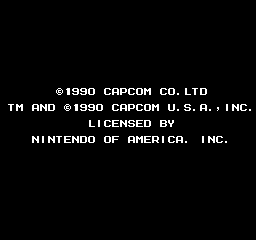
|
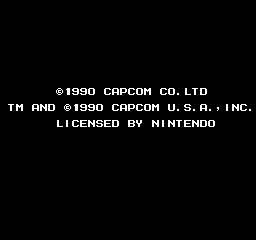
|
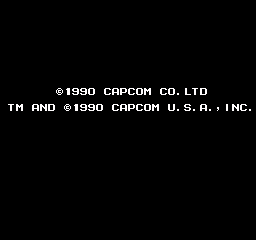
|
In the international versions, the trademark, copyright, and licensing info are on a separate screen, which fades in first before the title screen. While the US version specifies being licensed by Nintendo of America, the European version simply states "Licensed by Nintendo", and the Chinese version lacks this line altogether.
Title Screen
| Japan | International | Taiwan / China |
|---|---|---|
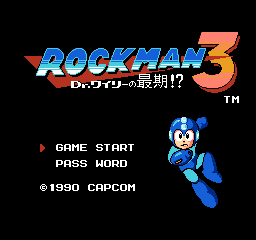
|
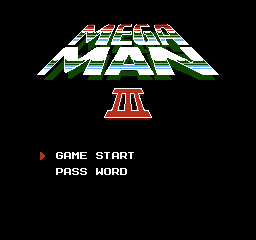
|
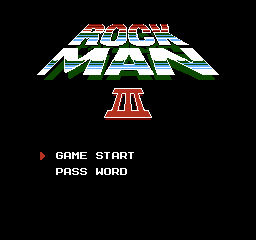
|
Aside from the usual logo change, the Japanese title screen features Mega Man's "you got..." sprite on it, the copyright date by Capcom, and a trademark symbol next to the logo.
The sole change to the Taiwanese / Chinese version of the game, beyond the minor edit to the copyright screen, is the "MEGA MAN" logo being edited to read "ROCK MAN". All other instances of the name "MEGA MAN" in the game are unedited, from the dialogue in the ending cutscene, right down to the background of the Password and Stage Select screens immediately after this title screen!
...What? You'd have expected them to release the original Japanese version or properly modify the USA version? Do you really think Capcom would do that?
Stage Select
| Japan | International / Taiwan / China |
|---|---|
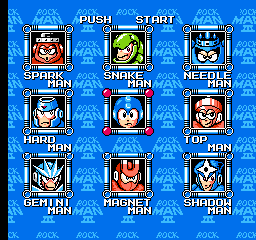 |
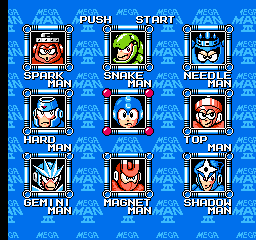 |
Curiously, Rockman 3 uses the Mega Man-style logo as its stage select background. In Mega Man: The Wily Wars, this wasn't the case, as it was replaced with the Rockman-style logo for Rockman Mega World in Japan.
Room Change
| Japan | International / Taiwan / China |
|---|---|
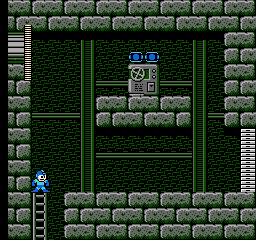 |
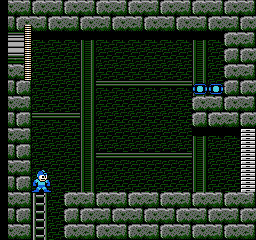 |
Near the end of Wily Stage 1, the Japanese version has a broad platform situated in the top-center of the screen, on which the two large weapon capsules sit. The international versions move them to a smaller, lower one above the door, which forces the player to switch weapons mid-air if they don't want to refill Rush Coil or Rush Jet.
Enemy Behavior
| Japan | International / Taiwan / China |
|---|---|
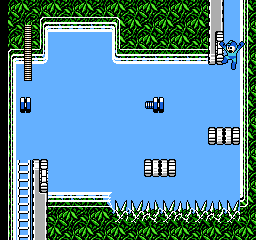 |
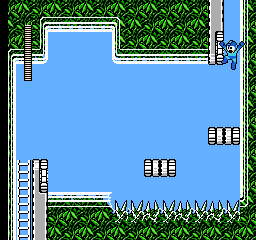 |
In the Japanese version, the Bolton and Nutton enemy in this room in Top Man's stage appears as you're falling from the room above. In the international versions, it doesn't appear until you move to the left half of the platform you land on.
Also, before being assembled, the stationary part of these enemies flickers in the international versions.
Doc Robot Glitch
In the original Japanese version, the Doc Robot that copies the characteristics of Flash Man only shoots one bullet instead of a bullet spread, and the duration of his Time Stopper is also extremely brief. You can clearly see him being capable of shooting more than one bullet at a time in case you happen to die against him (in the short time frame before a restart or game over).
Water Glitch
For reasons unknown, in the Gemini Man Doc Robot stage, the water in the corridor leading to the second boss room was removed in the international versions, though the water graphics are still there. This causes a water splash and accompanying sound effect to occur when Mega Man enters the water-filled boss room. This was restored to its original Japanese state in the European revision 1 ROM.
Pausing
Unlike in the Japanese version, bringing up the pause menu resets Mega Man's invincibility frames in the US version. The length of Mega Man's animation after coming out of the menu is also increased in the Japanese version if he was standing still in the firing pose before going into the pause menu.
Revisional Differences
Mega Man Anniversary Collection
Title Screen
The "III" in the logo was redrawn, and Mega Man's sprite was restored from the Japanese version.
| NES | Anniversary Collection |
|---|---|
Dialogue
Dr. Light's dialogue shortly before the Wily U.F.O. cutscene was reworded. Although the spelling of Wily's name was corrected, neither an exclamation point or period was included at the end of the sentence.
| Original | Mega Man Anniversary Collection |
|---|---|
| Oh no! Right after we received the last element... Wiley ran off with Gamma! | My goodness!! As soon as I got the last energy from Mega Man, Wily... That Wily stole Gamma |
Miscellaneous
During the ending sequence of the original game in all regions, Dr. Light was referred to as "Dr. Right", his Japanese name. This was changed in Anniversary Collection, where he is instead listed as "Dr. Light". Subsequent releases have not retained this change.
- Pages missing developer references
- Games developed by Capcom
- Pages missing publisher references
- Games published by Capcom
- Games published by Nintendo
- Games published by Ubisoft
- NES games
- Arcade games
- Windows games
- Pages missing date references
- Games released in 1990
- Games released in September
- Games released on September 28
- Games released in November
- Games released on November 1
- Games with unused graphics
- Games with unused music
- Games with unused sounds
- Games with debugging functions
- Games with regional differences
- Games with revisional differences
- Pages with a Data Crystal link
- To do
- Mega Man series
Cleanup > Pages missing date references
Cleanup > Pages missing developer references
Cleanup > Pages missing publisher references
Cleanup > To do
Games > Games by content > Games with debugging functions
Games > Games by content > Games with regional differences
Games > Games by content > Games with revisional differences
Games > Games by content > Games with unused graphics
Games > Games by content > Games with unused music
Games > Games by content > Games with unused sounds
Games > Games by content > Pages with a Data Crystal link
Games > Games by developer > Games developed by Capcom
Games > Games by platform
Games > Games by platform > Arcade games
Games > Games by platform > Windows games
Games > Games by publisher > Games published by Capcom
Games > Games by publisher > Games published by Nintendo
Games > Games by publisher > Games published by Ubisoft
Games > Games by release date > Games released in 1990
Games > Games by release date > Games released in November
Games > Games by release date > Games released in November > Games released on November 1
Games > Games by release date > Games released in September
Games > Games by release date > Games released in September > Games released on September 28
Games > Games by series > Mega Man series
The Cutting Room Floor > Unimportant Awards > NES games

